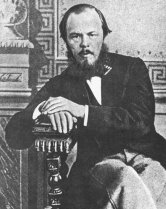|
Fyodor Mikhaylovich Dostoyevsky 
German Epilepsy Museum Kork www.epilepsiemuseum.de |
Fyodor Mikhaylovich Dostoyevsky is without doubt the most well-known of all famous people who had epilepsy. Dostoyevsky's illness is a known fact to many people who otherwise have no knowledge of epilepsy, and indeed, for many people, reading Dostoyevsky's works is the first intensive contact that they have with a person with epilepsy. More than anyone else, Dostoyevsky used his own illness and the suffering that went with it as a theme in his writing. The writer made many people in his stories and novels have epilepsy. The most well-known figure is Prince Myshkin in the novel "The Idiot". This character also reveals most about Dostoyevsky's own illness. |

 We can take it as read that the many accounts of epileptic seizures which Dostoyevsky gives in his works - the crescendo-like onset of the seizures, their overwhelming symptoms, the dramatic effects which the seizures have on the people around the person with epilepsy - are based on the writer's own experience..
We can take it as read that the many accounts of epileptic seizures which Dostoyevsky gives in his works - the crescendo-like onset of the seizures, their overwhelming symptoms, the dramatic effects which the seizures have on the people around the person with epilepsy - are based on the writer's own experience..

